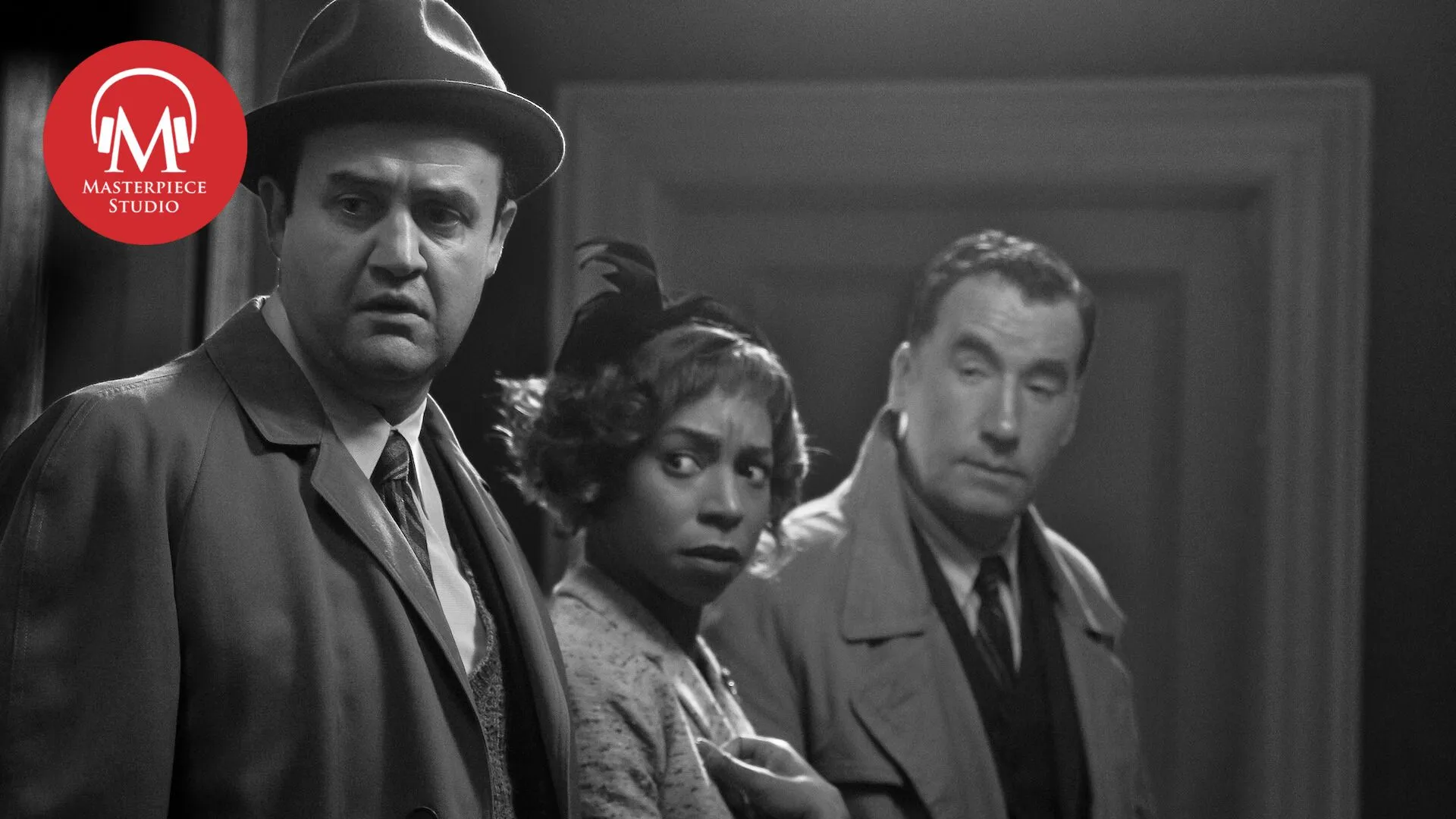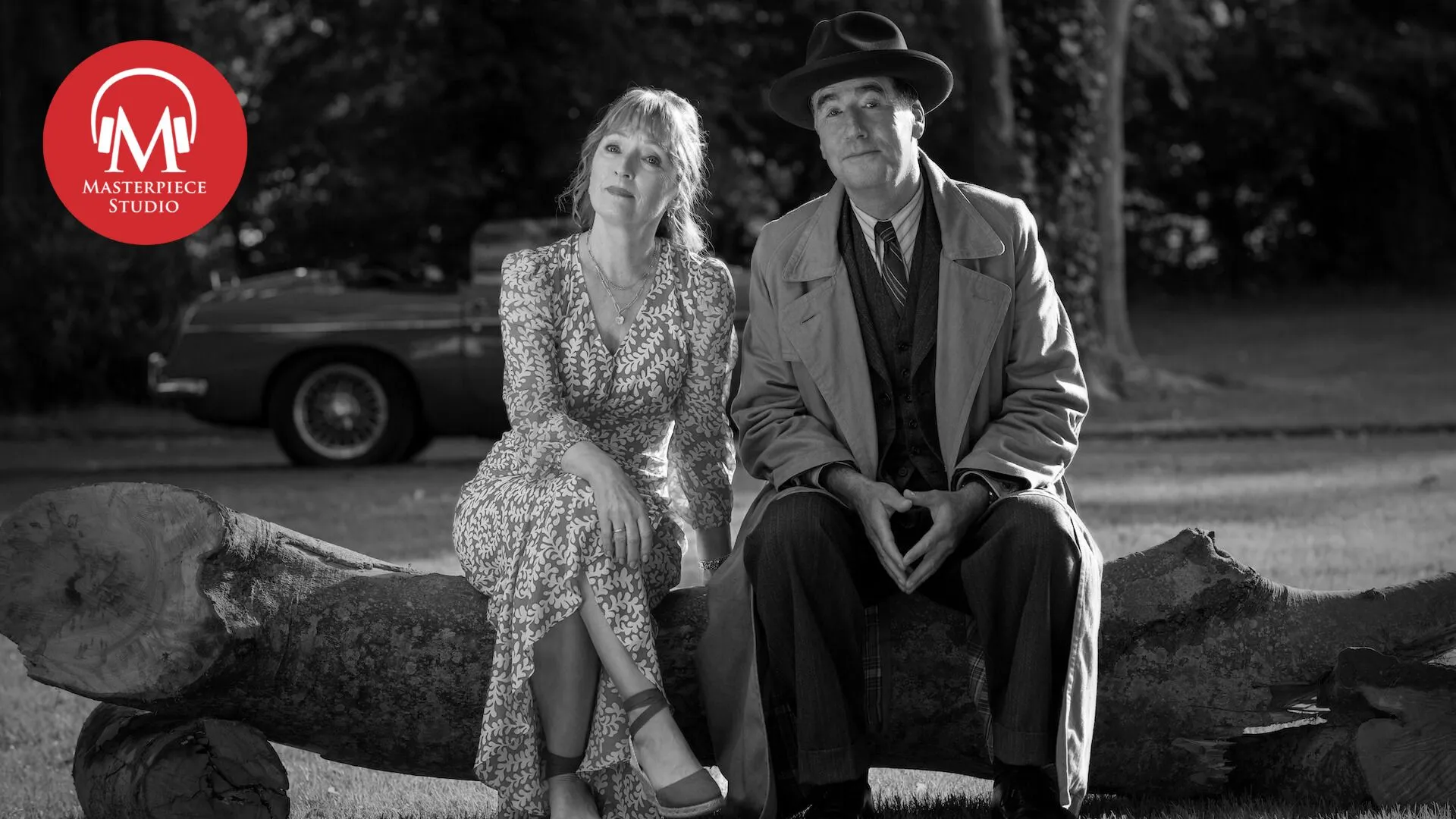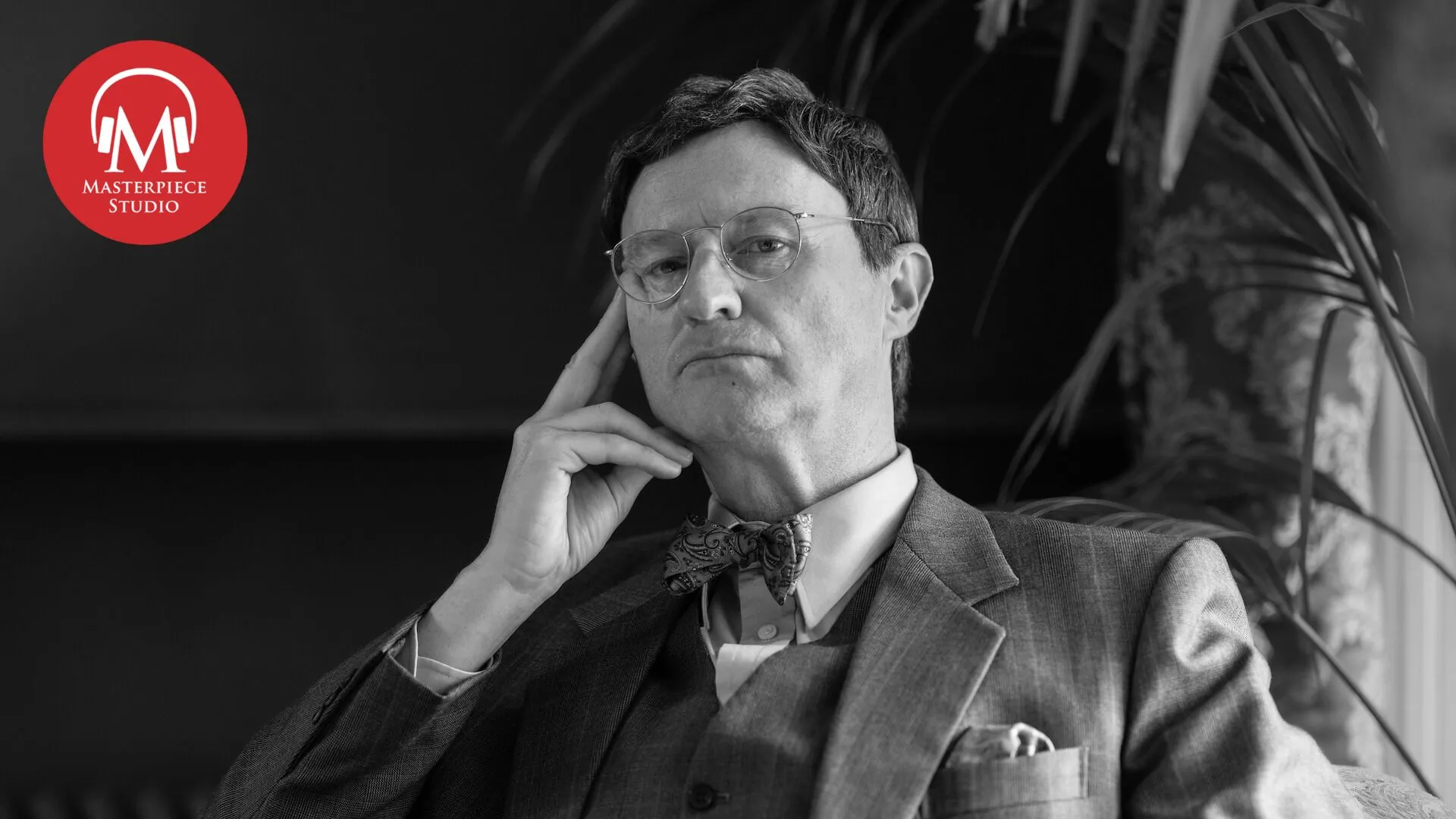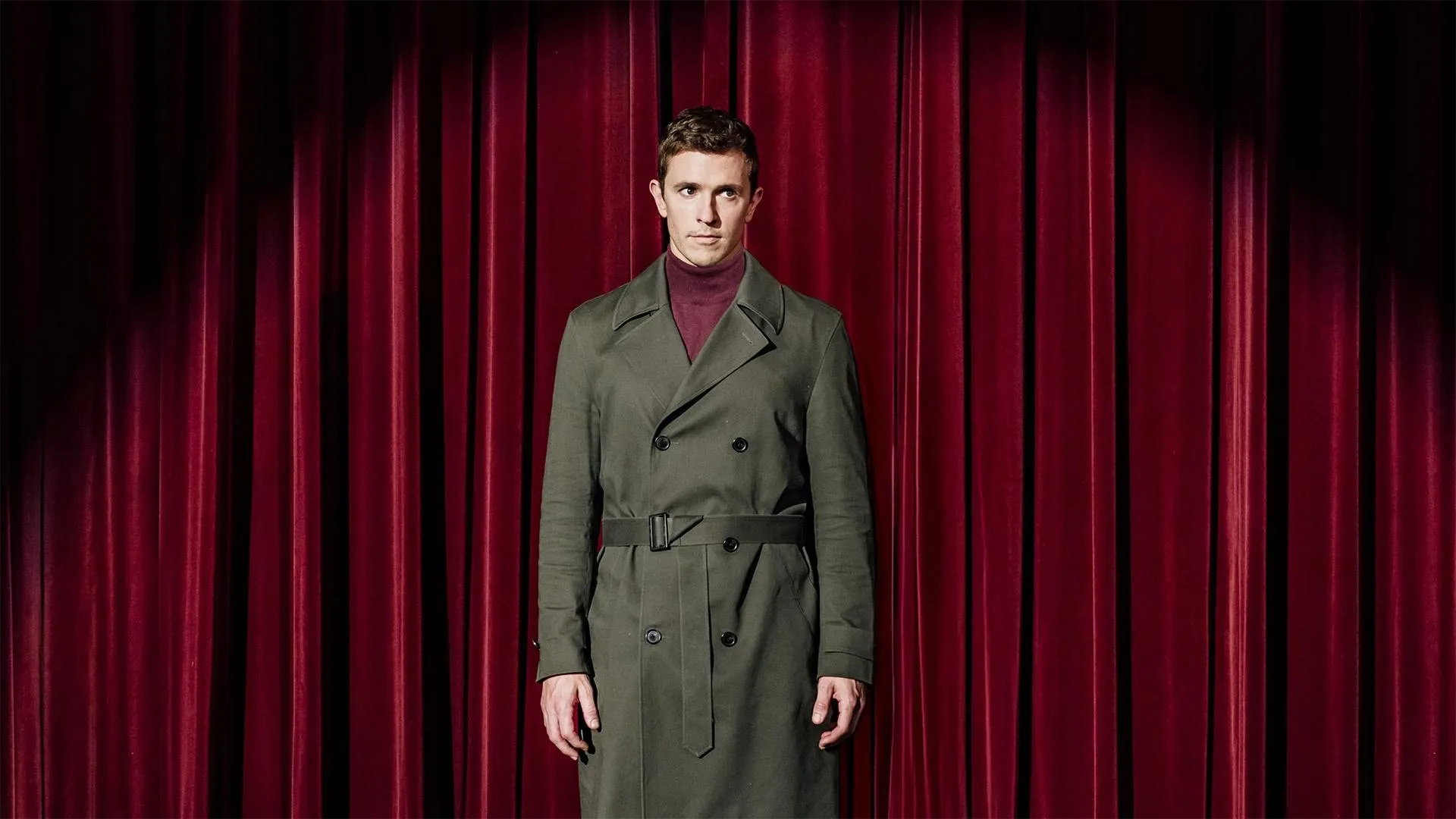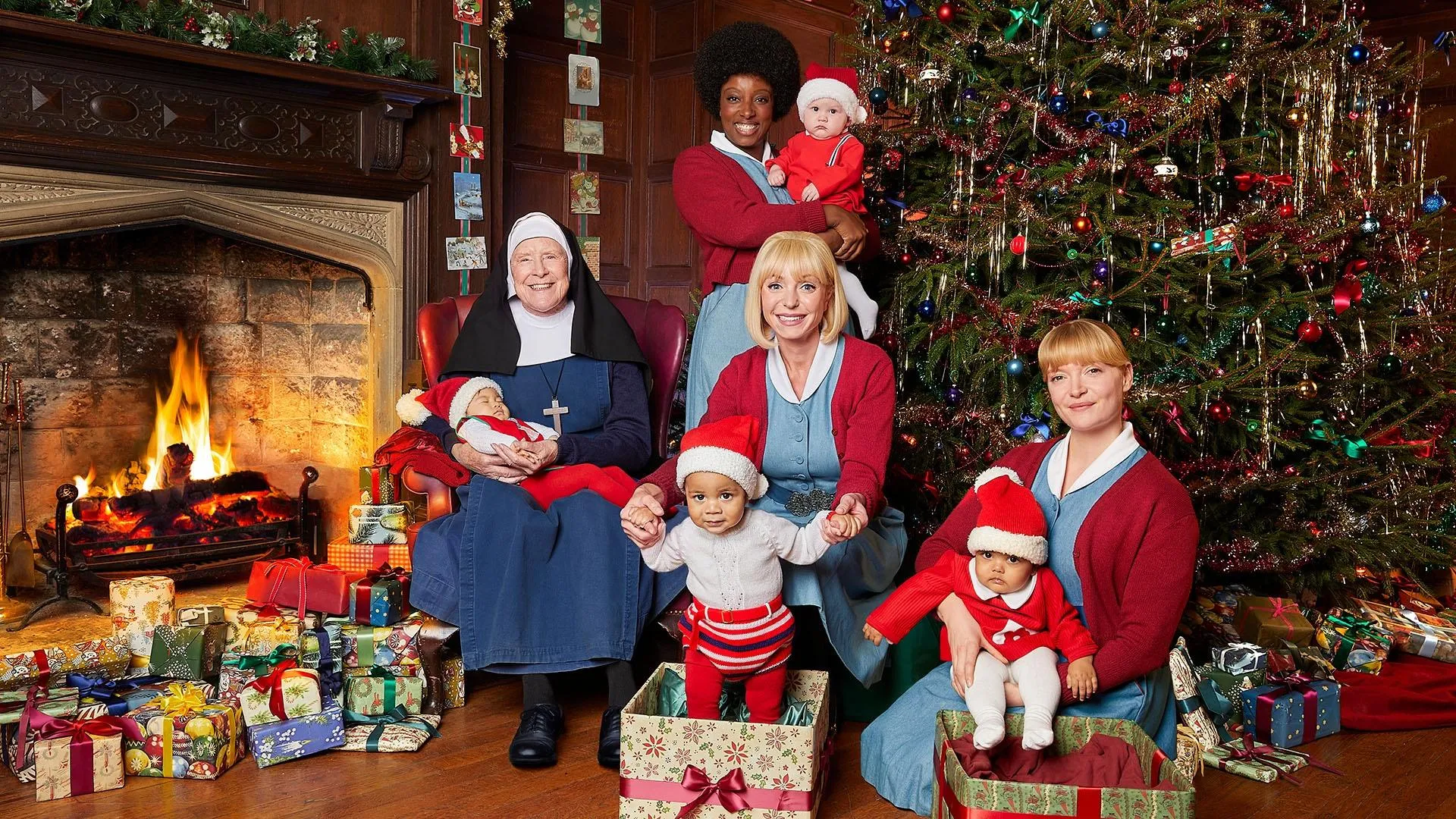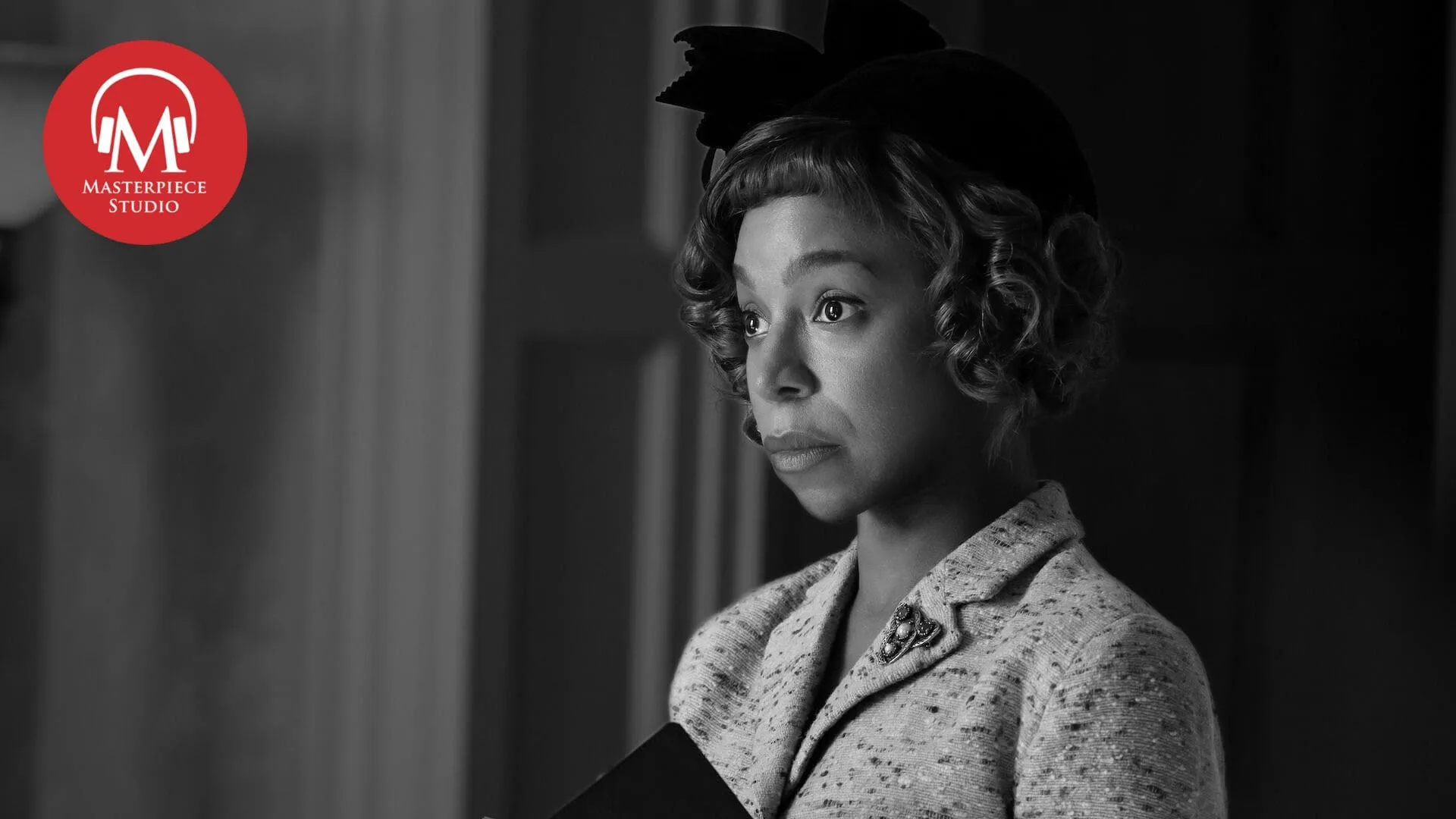
Pippa Bennett-Warner, Moonflower Murders | MASTERPIECE Studio
Released October 7, 2024 26:35
WARNING: This episode contains spoilers for Moonflower Murders Episode 4.For actor Pippa Bennett-Warner, Madeline Cain is the perfect cozy murder mystery character. She’s delightful, respectful, and impeccably dressed. As detective Atticus Pünd’s efficient assistant, Madeline keeps things organized and anticipates her boss’s needs, but beneath this flawless facade lurks a woman who can’t hide her adoration for murdered actress Melissa James. Today, Pippa brings us inside Madeline’s world, that of 1950’s Devonshire, and gives us a glimpse into what makes her character tick.
This script is lightly edited for clarity.
Jace Lacob: I’m Jace Lacob, and you’re listening to MASTERPIECE Studio.
We first meet Atticus Pünd’s efficient assistant, Madeline Cain, in the detective’s cozy, dim second floor flat and office. Madeline is organized, impeccably dressed, and has a sharp eye for small details that make a big difference.
CLIP
Atticus: Now, I believe I have a fairly quiet week which will allow me to continue with my book.
Madeline: Yes, here is chapter four.
Atticus: You have already typed it for me.
Madeline: I had nothing to do last night so I thought I’d get ahead.
A former employee of Associated Biscuits, Madeline is far more used to tackling profit and loss statements than dead bodies. She might be the queen of the office, but in the field, she gets a little green around the gills when stumbling onto a crime scene. However, Madeline's sharp eye makes her the perfect detective’s assistant. But sometimes, the motivations behind her observations aren't always immediately apparent.
CLIP
Madeline: Oh, look at this.
Chubb: That’s a prop from one of the films.
Madeline: A Turkish dagger. It’s a wicked looking thing.
Chubb: No, she was strangled, not stabbed.
Today, we speak with Madeline Cain herself, actor Pippa Bennett-Warner, about what makes her methodical character tick, and why she is so invested in finding out who killed Melissa James.
Jace Lacob: And this week we are joined by Moonflower Murders star Pippa Bennett-Warner. Welcome.
Pippa Bennett-Warner: Thank you so much. Hello, how are you?
Jace Lacob: I'm good. How are you doing?
Pippa Bennett-Warner: I'm good, thank you.
Jace Lacob: We first meet Madeline Cain, Atticus Pünd's highly efficient assistant in Episode Two of Moonflower Murders. What did you think of the character initially? Did you have an instant connection or rapport with her?
Pippa Bennett-Warner: I think I did. I remember reading the scripts, and I think I initially read maybe Episodes One, Two, and Three, and she just really jumped off the page and I felt like I knew exactly how I wanted to play her. And the majority of that was probably to do with Anthony's brilliant writing, but I don't know, there was something about her that I found very um intriguing and obviously because she's kooky as hell. I suppose I just found that she just… sometimes you read something, and you just really connect and you go, I know exactly what my version of that character would be. And I just think Madeline was one of those.
Jace Lacob: The description of Madeline in Anthony's script leaves a lot of room for an actor to make the role their own. He says, “She's mid-forties, unmarried, a career woman, severely presented, but with a warm heart.” And in the office, we feel she's deeply in control. Outside of its walls, she feels perhaps maybe off balance. What did you make of that contrast?
Pippa Bennett-Warner: I'm smiling as I'm listening to that back. Well, for an actor, that's completely delicious. As I was going through the process of discovering what I wanted to do with her, there are so many ways that you could play Madeline, and she is this sort of incredibly sweet, incredibly focused, quite brilliant assistant. But then there is a rod of steel in there that kind of goes all the way through her.
When I read that, I just laughed, actually. I found it quite funny. I found it quite funny. And then I started to read her. And I was just like, no, she's a little bit mischievous. She's going to be troubled but in a really fun way.
Jace Lacob: And she is, how she is. So, you mentioned Anthony. Anthony Horowitz is a prolific writer. He's put his pen to everything from Midsummer Murders and Foyle’s War to James Bond, Alex Rider, Sherlock Holmes. How familiar were you with his work ahead of your audition for Moonflower?
Pippa Bennett-Warner: He was sort of the writer of my childhood really. So, it was quite surreal when I met him. I was just like, oh my god, that's Anthony Horowitz and he's just the nicest man ever. I was not really familiar with his script writing in terms of, I'd never read anything of his before, only books. But his writing is so good and because there are so many twists and turns, you can't put the scripts down. You just can't, he's so good. And something will come out of nowhere and you'll go, Oh my God, that's so clever. I mean, he's just so clever and intelligent. It definitely comes across in his books, but it absolutely comes across in his scripts too.
Jace Lacob: Your acting CV covers everything from Shakespeare, Abi Morgan and Zadie Smith to Tony Kushner, Vivienne Franzmann. In reading those scripts then, in meeting this man whose work you read as a child, what was it about the writing specifically that struck you?
Pippa Bennett-Warner: I think it's the kind of intelligence of the writing that I really enjoyed, and somebody who also is clearly at the very top of his game and also having fun with it. I think that's something that Anthony does really well. It’s like, yes, it's very smart. And his work is prestigious and everything, but you can tell that he's having fun. And then in turn, when you read, you have fun, too. I've seen Episodes One and Episodes Four, and the show is gorgeous, but it's also really fun. It just has that element of cozy, fun, murder mystery.
Jace Lacob: Madeline is an interesting character. She exists firmly within the 1950s setting of Atticus Pünd Takes the Case, and unlike many of the other characters in Moonflower, she doesn't have a modern-day analogue. Her experience is entirely within the confines of that sort of cozy, as you say, Agatha Christie style golden age crime novel. How comfortably does Madeline inhabit that world, the world of cozy murder mystery?
Pippa Bennett-Warner: Oh, I mean, she's the perfect person to be in a cozy murder mystery. She's, on the surface, completely delightful, very respectful, wants to do the right thing, looks immaculate, has a wonderful array of costumes and shoes and bags and everything. I mean, she's perfectly turned out. I think she revels in her position. Her backstory is that she used to work at a company called Associated Biscuits, which always used to really make me laugh.
I was one of the only cast members that didn't have two parts, and we filmed all of the 50s stuff for the first month and I remember getting to the end of the shoot and just having the best month. I was like, I will do anything in the modern! I'll be a tree! I don't mind. Just let me stay. But unfortunately, I wasn't able to stay. It was one of those jobs where we all got on so well. It was just a real treat.
Jace Lacob: As a pair, Madeline Cane and Atticus Pünd feel incredibly well balanced. There's a sense of yin and yang about them. Madeline is polished and efficient, but emotional. Pünd feels analytical and detached at times, but there's a true warmth between them. What do you make of Madeline and Pünd’s dynamic? How would you describe the two of them?
Pippa Bennett-Warner: Oh, I just love them so much. I love them. It's possibly because I also just really love Tim, but the dynamic between them is so great. And she's so devoted to him, and I think he's sort of quite taken with her. They just fit together in a really sweet and charming way. And Tim's very funny as a person and is such a wonderful scene partner. I mean, he's so generous.
I hadn't met him before we started working together. And on the first day, Pünd and Madeline just appeared, and it was just a really lovely fit. And it just made all of our scenes just really joyful because we were just immediately on the same page, which was really nice.
Jace Lacob: Madeline's world is that of Pünd's. She thrives on being productive, on anticipating his needs. She types up Pünd's notes on chapter four of his landmark criminology book at night, rather than going home. How does that one action perfectly sum up her character?
Pippa Bennett-Warner: Oh, she's hilarious. If she wasn't so endearing, you'd sort of want to be like, oh, Madeline, come on, get a life. But she's so helpful that that sums her up in such a way because she's incredibly devoted. And going back to Anthony's description of her, bless her. I mean, she doesn't really have much else going on. But then again, doesn't she? I don't know, if you really interrogate it, you could be like, hmm, is that a front? But I think ultimately, I think there's a really good person in there. But I think her mental health is an interesting subject to touch on, perhaps.
Jace Lacob: I don't get the sense she has a healthy work-life balance, we can say.
Pippa Bennett-Warner: No.
Jace Lacob: Pünd says to her,
CLIP
Atticus: Sometimes, I think you know me better than I know myself, Ms. Cain.
Madeline: It is my job, Mr. Pünd.
Jace Lacob: She's a woman whose entire raison d'etre is focused entirely on work, on routine, organization, efficiency, on anticipation. And I think that putting someone else's needs above her own, before her own, might belie, yeah, maybe some unhealthy choices elsewhere in her life.
Pippa Bennett-Warner: Yeah, I think if she concentrates on other people, then she doesn't necessarily have to concentrate on herself, or necessarily have to look into why she's like that, if that makes sense. I think concentrating on other people's needs and putting them before hers is a good healthy distraction for her.
Jace Lacob: In Episode Two, Madeline and Pünd drive to Tawleigh and Pünd says he doesn't like machines. What did you make of this sequence of this very deep emotional moment of connection between Madeline and Pünd here?
Pippa Bennett-Warner: I feel like it kind of sets the tone for the relationship throughout the rest of the season. I feel like Pünd really opens up to Madeline and allows her in. There's almost like a father daughter bond and connection. And she's very consistent is Ms. Cain, and I think he feels kind of safe around her, dare I say it? And she in him. Playing all those beats with Tim were just so lovely. I think he's just one of the greatest actors ever. I think we see a side to him that's just really soft and meaningful.
Jace Lacob: Her instinct is to anticipate Pünd's needs. She takes notes, she asks questions of Chubb, of others, as a way of drawing out details for Pünd's analysis. And she notices details, such as the Turkish dagger. But she seems ill-suited for fieldwork, we'll say, fainting at the crime scene.
CLIP
Madeline: I worked with Associated Biscuits for 12 years before I came to Mr. Pünd, and I can assure you I have never experienced anything like this.
Atticus: Shall we call the doctor?
Madeline: No, no. I just need a minute to catch my breath.
Jace Lacob: How do you see the balance of comedy and pathos within Moonflower Murders? Does Madeline dwell on the line between the two?
Pippa Bennett-Warner: I think so. I mean, comedy is just scattered throughout it. Obviously, I hadn't seen any of the modern parts until I was at the screening the other week. And it's just so delicious and all really funny. I think she leans into it and I kind of just kept pushing it as far as I could, because there was such a freedom in her slight nuttiness that I really enjoyed.
And she's quite old fashioned and traditional, which was also really nice. There's a bit in, I think it's Episode Four actually, there's like a big scene between Danny, Tim and I, and she's talking about all of the suspects and some of them she can't bear and there was real joy in finding her comedy beats. And I suppose I could kind of push it a bit more because of the heightened reality of it being not in the “real world” if that makes sense.
Jace Lacob: It just works so well. It's so great. Pünd has a tenderness for Madeline that I think really works effectively to humanize his character.
CLIP
Atticus: I hope you slept well and were able to put the events of yesterday behind you.
Madeline: I feel very foolish. If I’m going to be working with a detective, then I should expect unpleasant details to be part of the job.
Atticus: Not at all. I’ve never allowed myself to become inured to the sight or the description of violence. Murder, it’s not a business, nor is it a pastime. Your sensitivity does you credit.
Madeline: I just hope you can find who is responsible.
Atticus: That is why we are here.
Jace Lacob: And while it's clear she respects Pünd as an employer, how does Madeline view Pünd as a person? What is her take on Pünd at this point?
Pippa Bennett-Warner: I think she admires him. I mean, she's quite bossy underneath it all, I think. So, I think she'd probably like to get him a little bit better order, maybe. She gets ahead and does all his work for him and types things out and stuff, but I think she's charmed by him, but also, I think there's a part of her that can't quite believe that she's managed to get this job. She's managed to talk her way into being a detective's assistant. She's working on an active case. I mean, that's quite cool coming from a biscuit factory to suddenly being, not high up, but certainly being trusted, a trusted member of the team to be going on all of these excursions to find murderers. I think she finds him really exciting and new. This is a whole new world for her.
Jace Lacob: From custard creams to custody.
Pippa Bennett-Warner: Brilliant. I love that. Absolutely.
MIDROLL
Jace Lacob: Pünd questions producer Oscar Berlin and Madeline says he's lying about walking on the beach at 6pm, catching Berlin in a lie. But she made up the whole story about growing up near Tawleigh. She says, “I could see he was fibbing, and I thought I might be able to flush him out.” Which earns a smile from Pünd who says, “You're a remarkable person.” What does that moment mean to her, his approval? Is Madeline transforming to be what Pünd needs her to be?
Pippa Bennett-Warner: Yes, totally. I think she wants his approval at all costs. And I can't imagine, really, that her family life is particularly rich. So, to have won brownie points with him is just a huge deal for her. She's delighted, because he's so smart and dare I say it, her old boss at Associated Biscuits, I don't think she held him in quite as high regard. She definitely feels very chuffed that Pünd has recognized her quick thinking.
Jace Lacob: Madeline's entire look is about control. She's perfectly put together, perfectly styled, perfectly accessorized. Was getting into character as Madeline, as simple as putting on that constrictive 1950s outfit and auburn wig?
Pippa Bennett-Warner: So, there's a story behind the auburn wig. Catherine Argue, who was the hair designer, who was just fantastic in every which way, she's such a lovely person and just brilliantly good at her job. That wig was called Whitney, after Whitney Houston. And she dyed it auburn because of Rosalie having auburn hair, who plays Melissa, who is Madeline's great obsession. So, she dyed it so that as if Madeline had copied her idol's hair, which I think is a really nice touch.
So, when I put that on in my fitting, I was like, ooh. I always find that clothes and hair and makeup and little accessories just end up being the final bit of the puzzle. So, you've got the script and then you put your interpretation on that. And then when you go and meet the other, I suppose, creatives, HODs, and they put their take in, collaboratively, you've then got this 3D, fully functional human being. I really enjoy those parts of building a character because, if Madeline was in a different wig, or in a different suit, I might have played her completely differently in a way. There was something about the tightness of the suits and the kind of slightly mad hair that just helped to inform my decision to play her the way I did.
Jace Lacob: So, it's sort of her version of a Michael Jordan, number 23 Chicago Bulls basketball jersey?
Pippa Bennett-Warner: There you go. There you go. Absolutely.
Jace Lacob: Madeline is very invested in this case. She surprises Pünd and Chubb by saying,
CLIP
Madeline: I know you’ll find out who did this, Mr. Pünd. Forgive me for saying this, but I hope they hang.
Chubb: I’d say that’s unlikely Ms. Cain.
Madeline: Do you not think Mr. Pünd will solve the case?
Chubb: Oh, sure he will. The death penalty is awfully rare these days. Judges no longer have the appetite for it.
Jace Lacob: Why is this case getting under her skin? Is it simply because it's her first in the field?
Pippa Bennett-Warner: I think she's madly in love with Melissa James and she's taken her murder incredibly personally. She's like a super fan. If Madeline Cain was living in the real world in 2024, I would imagine she would be really trying to kind of put herself in a space where she could come into contact with Melissa James, or at least take a selfie.
You know, you do hear stories about people taking things very seriously about actors and musicians that they really like. So, I think she'd possibly be in that camp. But yeah, I think she's just taken it deeply personally that someone would dare to kill Melissa James!
Jace Lacob: She would have a Melissa James TikTok these days.
Pippa Bennett-Warner: 100%. She's got the merch, she's already got the t-shirt. It would be like the equivalent of being a Swiftie probably, a really diehard Swiftie.
Jace Lacob: Your professional acting career started at age 11 when you starred in Julie Taymor's 1999 West End production of The Lion King as Nala. How formative an experience was this, and how did it kickstart your desire to act professionally?
Pippa Bennett-Warner: Oh my gosh, I mean, it was incredible, that whole experience. I think we did, as the children, maybe about nine rounds of auditions. It was an open audition. I think they whittled it down from 3,000 to six kids. And it was amazing. I mean, my mom actually told me quite recently, they almost fired me because I was too tall. And then she was like, you can't fire her, we've told all her friends! So, they kept me on.
It was wonderful. I remember being in the sitzprobe, which of course, at that time, I had no idea what that word meant. And all the adult cast was singing the songs. And Big Nala and everybody, and Rafiki and it was kind of dreamy, that whole experience. I look back on it now and I wasn't particularly nervous or anything. I remember going on stage and not really feeling nervous, but I think there's such a beauty of being protected by your innocence and I suppose your childhood, that everything seems so fun. I think if I were to do that now, I'd probably be terrified. But it was just a really wonderful way to start in this industry.
Jace Lacob: True or false, as a child you wanted to study medicine at Cambridge?
Pippa Bennett-Warner: True! Oh my god, how do you know that? Yes, true, I did, I did. And then my grandfather died when I was 12, and then I kind of got the heebie jeebies about not being able to save people, and that really stuck with me, and I was like, no, I'm going to go act, and sing, and dance, and then maybe one day I'll get to play a doctor instead.
Jace Lacob: It’s safer. Safer.
Pippa Bennett-Warner: Exactly. Exactly.
Jace Lacob: Moonflower Murders isn't your first brush with an Agatha Christie style murder mystery, or even the 1950s, as you also appeared opposite Sam Rockwell and Saoirse Ronan in 1950s mystery thriller See How They Run. Why do you think Agatha Christie style Golden Age mysteries have endured?
Pippa Bennett-Warner: Oh, well, they're just so fun and they’ve got these amazing characters, really kind of fun heightened characters. And they always look pretty incredible as well. So, they're a feast for the eyes and they’re feast on the page. They're really fun. I just feel like Agatha Christie type murder mysteries will forever be top of people's lists of things to watch. They're just delightful. And in fact, sometimes they can actually be quite scary, but there's a real joy, there's a real joy in there.
Jace Lacob: You act, you also write, you narrate audiobooks and perform voiceover, including lending your voice as Melania in what I consider to be one of the best video games of all time, Elden Ring. Did you realize at the time when you were recording that, that that game would be as huge a cultural juggernaut as it's become?
Pippa Bennett-Warner: I think this is the first time I've ever spoken about it, and I did not. I recorded it, I believe, in lockdown or just when lockdown, when in the UK, I think we were maybe in half lockdown or something. It was during that COVID time anyway. And no, I had no idea. I was given, I don't know, was it 10 lines or something? I did it in an hour and a half. And then it came out. And I suddenly was like, oh, oh, and because I don't game, and I hear she's incredibly difficult to beat, like I get messages from people saying that she haunts their nightmares and things like that.
So, I apologize to anybody who's listening if you can't listen to this because it's my voice. But no, I had no idea, and I'm delighted that she's gone down so well. Obviously, I've heard my bits of it, but I do quite want to have a go and see if I can beat Melania myself, but I don't know if that would work. Do you game?
Jace Lacob: I do, and it took me, I think maybe a hundred, two hundred attempts to beat her.
Pippa Bennett-Warner: No, stop!
Jace Lacob: Yes. Yes. And then I saw that you voiced her, and I thought to myself, oh no, this is going to be potentially triggering for me.
Pippa Bennett-Warner: Are you okay? Should we stop?
Jace Lacob: I'm okay. I will tell you someone online, I think, made a 90-minute supercut that's just you saying, “I am Melania, Blade of Miquella”, over and over and over again because every time you fight her, you hear that.
Pippa Bennett-Warner: Every time?
Jace Lacob: Every time. And it permeates your dreams after a while. So yeah, you sort of are living rent free in many, many Elden Ring fans’ brains these days.
Pippa Bennett-Warner: I'm so sorry. I'm so sorry. Oh, God.
Jace Lacob: No, it's great. It's great. You play Shannon in Gangs of London.
Pippa Bennett-Warner: Yes.
Jace Lacob: Which is a very different role to that of Madeline Cane in Moonflower. Your CV shows such a range of characters, genres, time periods. Do you see yourself as a chameleon? Do you relish playing such vastly different characters? Or is it difficult to leave them behind when you wrap?
Pippa Bennett-Warner: Sometimes it can be difficult to leave them behind. Shannon's become more useful in real life, even though she's quite a dangerous woman. But if I ever feel scared about doing something, sometimes I go, what would Shannon do? Shannon would do this. And so, then I just go and do it. And that's quite nice. I've always been attracted to these, interesting, I suppose, supporting parts that I can disappear into. And I also find supporting parts more interesting than lead parts, the majority of the time.
There's something where you can have a little bit of fun and disappear fully into them. But it's quite funny hearing you say all the different genres. Because I can never really remember what I've done in a weird way. It’s sort of like, I don't really watch myself.
Jace Lacob: What is next for you?
Pippa Bennett-Warner: I have just finished doing the film version of The Magic Faraway Tree, and I'm doing some writing and stuff. And directing, I'm directing something.
Jace Lacob: Oh. I can't wait for that. Pippa Bennett-Warner, thank you so very much.
Pippa Bennett-Warner: Thank you so much. Thanks, Jace.
Next time, Pünd, Cain, and Chubb close in on the killer, and finally, their hard work is beginning to bring this case into focus.
CLIP
Chubb: Are you absolutely sure Mr. Pünd?
Atticus: I do not believe John Spencer took his own life.
Chubb: Well, if he didn’t kill Melissa James, then who did?
Atticus: That is indeed the question Detective Inspector. But there is perhaps one person we’ve overlooked.
Be sure to tune in next week as we talk with Moonflower Murders actor Mark Gatiss, the man behind both timid film producer Oscar Berlin, and the prickly and manipulative Frank Parris.
Moonflower Murders Podcasts
4 More Podcasts
MASTERPIECE Newsletter
Sign up to get the latest news on your favorite dramas and mysteries, as well as exclusive content, video, sweepstakes and more.
